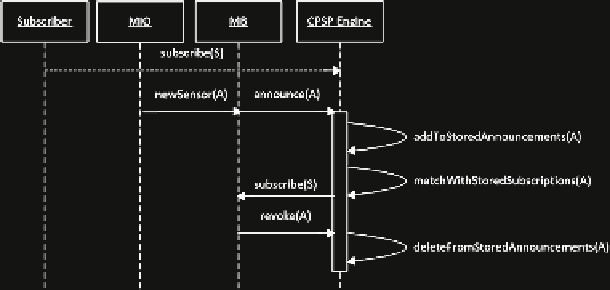Database Reference
In-Depth Information
Fig. 3.
Announcing a new publisher
event can be initiated by the MB (e.g., to save the battery when its level is
low) or MIO. Additionally, if there are alternative publishers and matching sub-
scriptions requesting this kind of information, the CPSP engine can activate
alternative MBs and their publishers.
Unsubscribe.
Clients usually unsubscribe when they are no longer interested
in publications coming from certain areas. When the CPSP engine receives an
unsubscribe
message, either from a subscriber or MB, it needs to delete the
subscription from the list of stored subscriptions. Additionally, if such a canceled
subscription is the last one which is interested in publications announced by a
specific publisher connected to an MB, the MB instructed to stop producing new
publications by forwarding an unsubscribe message.
4
Interactions with the OpenIoT Cloud Database
The QoS Manager has been chosen as a point of integration with the rest of the
OpenIoT platform since it monitors all the data acquired through the CPSP engine
and can decide which data needs to be stored permanently in the OpenIoT RDF
store. Thus users of the OpenIoT platform can search for mobile sensors in the
same fashion as when searching for fixed sensors, and receive the data being pro-
duced by mobile sensors by using the OpenIoT Request Definition and Request
Presentation components. Hereafter we describe the process of registering mobile
sensors with the LSM-Light component to enable the OpenIoT Scheduler process
to discover them and to retrieve data streams generated by mobile sensors.
4.1
Sending Data Through Virtual Sensors
The QoS Manager transmits all sensor readings which it received from the CPSP
Engine through the X-GSN component to be stored in the LSM-Light RDF store.
Since the X-GSN does not directly interact with real physical sensors but with

Search WWH ::

Custom Search